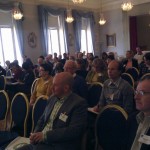About EEEN 2013
Organised on an annual basis in the United States since 2006 and Canada since 2008, the Swedish EPA hosts the 2nd European Environmental Evaluators Network (EEEN) forum on April 9-10, 2013. The objective of the forum is to advance the field of environmental evaluation, which we define as environmental policy and programme evaluation, through more systematic and collective learning among evaluators and evaluation users. At the EEEN forum we aim to bring together practitioners and users of environmental evaluation at any level and provide them with the opportunity to share views, knowledge and experiences about the use, importance and future of environmental evaluation in their respective organisations, domains and disciplines.
Evaluating transitions towards sustainable societies
The overall theme of the 2nd EEEN forum is on the evaluation of transitions towards sustainable societies. Extensive societal transitions are needed in order to solve the environmental problems we are facing. Different countries, and different actors within those countries, have different views on how such societal transitions can and should be defined and operationalized. Irrespective of which views and driving forces we are focusing on it all comes down to a transition of very complex societal systems. Societal transitions need to be evaluated in order for current initiatives to be improved and additional efforts to be developed. Evaluations are needed to increase knowledge about what works when it comes to policies and measures as being part of political programmes. Do the programmes lead to an improved state of environment?
The forum has two subthemes:
- Evaluation of innovation programmes
- Evaluation of environmental policies and objectives
Evaluation of innovation programmes
Knowledge and innovation development are cornerstones of the societal transition that is needed to meet the challenges of environmental problems we are facing. In several European countries innovation programmes are being used as a means of bringing about those changes that may lead to decreased environmental impact. Those programmes are complex and involve many actors which make heavy demands on the performance of programme evaluation.
Evaluation is an important tool for ongoing learning and knowledge development. How may the effect of these programmes be evaluated? Can the effect be connected to the measures those programmes are generating? Which methods are needed? What is the best way for different actors to be involved in the programmes, which role do they have?
Evaluation of environmental policies and objectives
In countries like for example Sweden and Norway the environmental politics are governed by politically set environmental objectives, which describe a desired state of the environment. In Sweden the objectives are to be followed up every year and an in-depth evaluation is performed every fourth year. Since a couple of years back the objectives are considered to be achieved if sufficient policies are found to exist and sufficient measures are carried out.
That approach reveals a focus on policy programmes, policy instruments and actions. New demands on evaluations of environmental objectives arise as the effects of policies need to be linked to the current state of environment. How may the complex chain from policies to the state of environment be illustrated and evaluated? Which kind of knowledge may and should evaluations of that kind contribute to? What methodological challenges are evaluations of policy instruments and actions presented with? Which experiences are connected to those kinds of evaluations? Which difficulties and opportunities?
Many of the challenges may be connected to the evaluation of the relation between policy programmes and environmental effects. Are the right actors involved? Are their driving forces being used in the best way? Do policies and measures lead to effective environmental work and an improved state of environment? What can we learn from, for example, evaluations of the EU structural funds programmes in relation to environmental issues? Those are also important examples of questions to be discussed from different perspectives and experiences on the 2nd EEEN forum. We warmly welcome papers and presentations within or linked to our two subthemes!
Audience
The EEEN welcomes evaluators and users of evaluation from all relevant fields (including climate change and adaption, biodiversity conservation, environmental education, energy, air and water quality, waste, land and fisheries management, sustainable consumption and production, behavior change, ecological restoration etc.) working in academia, government agencies, non-governmental organisations, European and international institutions and companies.
Format
The EEEN forum wants to create a space for a lively, creative, cutting-edge dialogue. The forum is organised around a number of plenary keynote speeches, panel discussions, thematic contributions by the participants and networking events.
The EEEN forum’s registration fee is 2700 SEK (excl. 25 % VAT), which equals about 300 EUR (excl. 25 % VAT), conference dinner included.
Welcome!









